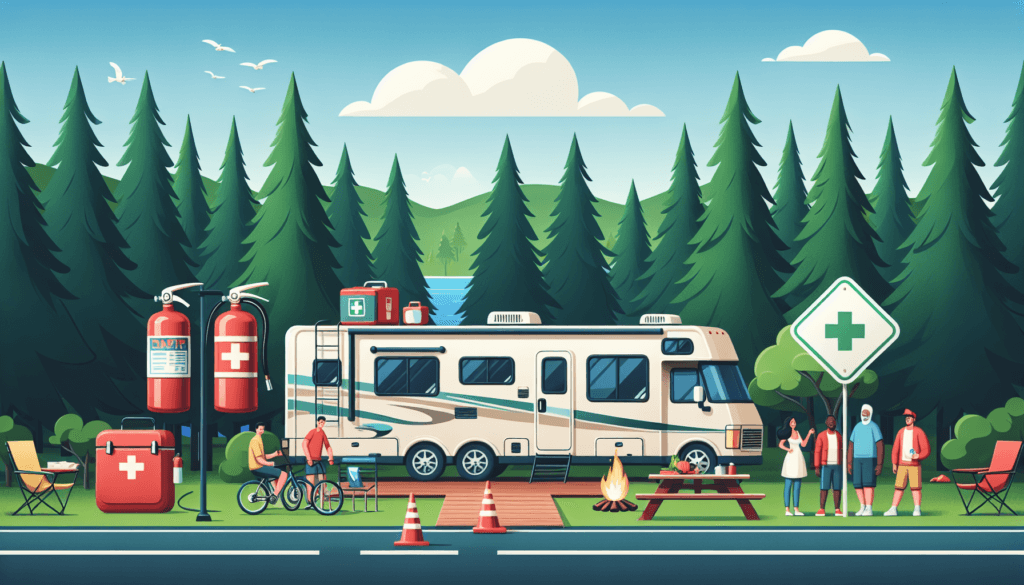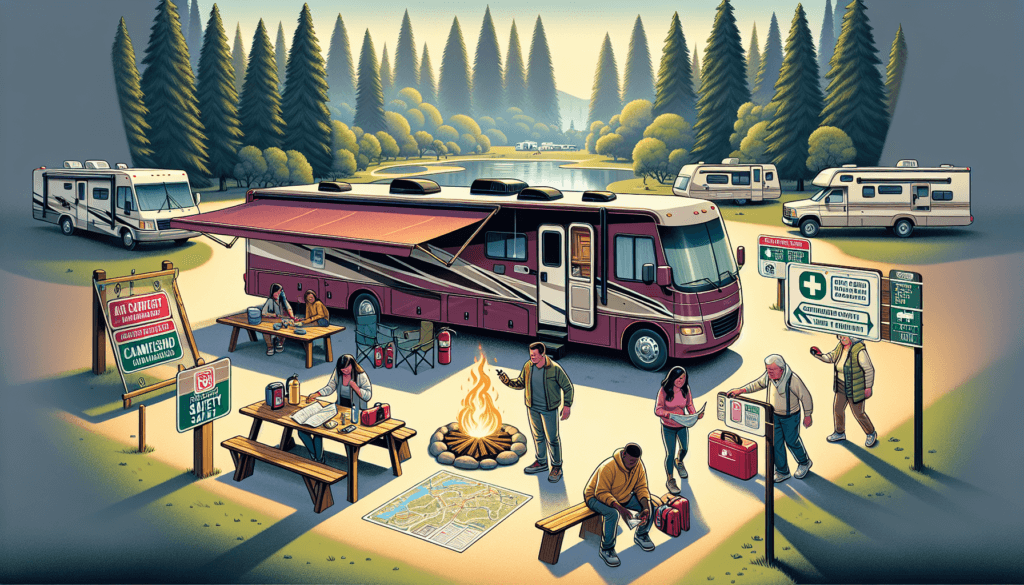Planning a memorable camping trip in an RV? Look no further! In this article, you will discover a compilation of essential safety tips specifically designed for every camper out there. From fire safety measures to proper gas usage and personal security, these tips will ensure a worry-free and enjoyable experience during your RV camping adventure. So, grab a pen and paper, take notes, and get ready to embark on an unforgettable journey while keeping safety as your top priority. Let’s dive in and explore the must-know safety tips for RV camping!

Choosing a Safe Campground
When it comes to choosing a campground for your RV camping trip, safety should be your top priority. Researching the campground beforehand is crucial to ensure that it meets the necessary safety standards. Look for campgrounds that are well-maintained and regularly inspected. Check online reviews and ratings from other campers to get an idea of the campground’s safety reputation. Additionally, consider the location of the campground. Is it in a safe area? Are there any nearby hazards or potential risks that could affect your safety?
Researching the Campground
Before finalizing your decision on a specific campground, take the time to research it thoroughly. Look for as much information as possible, such as the campground’s amenities, rules, and regulations. Ensure that the campground has a good reputation among fellow campers and that it is known for its safety measures. It’s also a good idea to check if the campground has any specific policies in place to ensure the safety and well-being of its guests.
Checking for Safety Amenities
When researching a campground, pay close attention to the safety amenities it offers. Some campgrounds have first aid stations or emergency response teams on site. This can provide peace of mind knowing that help is readily available if needed. Other safety amenities to look out for include well-maintained fire extinguishers, easily accessible emergency exits, and clearly marked paths and signage. These small but important details can make a significant difference in maintaining a safe camping environment.
Inspecting the Campsite for Hazards
Once you arrive at your chosen campground and have parked your RV, it’s essential to inspect your campsite for any potential hazards. Look out for uneven ground, exposed roots, or rocks that could pose a tripping or falling risk. Check the area for any low-hanging branches that could potentially cause damage to your RV or pose a danger during inclement weather. If you notice any hazards, inform the campground staff immediately so they can address the issue promptly.
Preparing for Emergencies
Emergencies can happen at any time, so being prepared is key to ensuring the safety of everyone on your camping trip. Creating an emergency kit is an essential step in your preparation. Your emergency kit should include items such as a first aid kit, flashlights, extra batteries, a portable phone charger, non-perishable food, water, and blankets. It’s important to periodically check and restock your emergency kit to ensure that everything is in working order.
Creating an Emergency Kit
Your emergency kit should include various essential items to help you navigate through unexpected situations. A basic first aid kit with bandages, antiseptic wipes, pain relievers, and any necessary prescription medications should be part of your kit. Additionally, pack flashlights or portable lanterns, extra batteries, and a whistle for signaling for help. Non-perishable food, water, and blankets are also crucial in case you find yourself stranded or affected by a natural disaster.
Knowing the Location of Emergency Services
While it’s essential to have your emergency kit ready, knowing the location of emergency services is equally important. Familiarize yourself with the nearest hospital, fire station, and police station to your campground. Make a note of any emergency phone numbers specific to the area you are in. It’s also a good idea to communicate your location to a trusted friend or family member back home, so they are aware of where you are staying in case of an emergency.
Learning Basic First Aid
Having a basic understanding of first aid can make a significant difference in emergency situations. Consider taking a basic first aid course before embarking on your RV camping trip. Learn how to treat minor injuries, perform CPR, and handle common emergencies such as burns, cuts, and insect bites. Having the knowledge and skills to provide immediate care until professional help arrives can potentially save lives.
Fire Safety
Fire safety is of utmost importance when camping, as fires can spread quickly and cause significant damage. Understanding fire regulations specific to your campground is essential. Follow any guidelines or restrictions put in place by the campground regarding open flames and campfire usage. Always use designated fire pits or grills when cooking or enjoying a campfire. Never leave a fire unattended and ensure that it is completely extinguished before leaving the campsite or going to bed.
Understanding Fire Regulations
Before starting a fire at your campsite, familiarize yourself with the fire regulations set by the campground. Some campgrounds may have specific restrictions on the type and size of fire pits or grills allowed. Others may have prohibitions on fires during certain times or under specific weather conditions. Adhering to these regulations not only ensures your safety but also helps preserve the natural environment and prevent accidental wildfires.

Properly Using Fire Pits and Grills
When using fire pits or grills, it’s important to follow proper safety precautions. Always keep a safe distance between your RV or other flammable items and the fire pit. Use long-handled cooking utensils to avoid getting too close to the flames. Never pour flammable liquids onto an open fire, as this can cause unexpected flare-ups. Staying vigilant and keeping children and pets away from the fire pit or grill is also vital for their safety.
Extinguishing Campfires Safely
Properly extinguishing a campfire is essential to prevent any chance of it reigniting or causing accidental fires. Start by reducing the fire to a manageable size using water or a fire extinguisher. Stir the embers and logs with a stick to ensure that everything is thoroughly soaked. Continue adding water or dirt to the fire until there are no remaining embers, and the fire pit feels cool to the touch. Remember, leaving a campfire unattended or improperly extinguished is not only dangerous but also against campground regulations.
Electrical Safety
Many RVs come equipped with electrical systems that require proper maintenance and usage for safety. Inspecting your RV’s electrical system before setting off on your camping trip is crucial. Look for any signs of wear and tear or exposed wires. Ensure that all outlets, switches, and appliances are in good working order. Faulty electrical systems can pose a serious risk of electrical shock or even fires.
Inspecting the RV’s Electrical System
Take the time to inspect your RV’s electrical system thoroughly. Check the cord and plug for any damage or fraying. If you notice any exposed wires, have them professionally repaired before using the electrical system. Test all outlets and switches to ensure they are functioning correctly. Pay attention to any sparks, unusual noises, or burning smells, as these can indicate electrical problems that need to be addressed before your trip.
Using Electrical Hookups Properly
When connecting your RV to electrical hookups at the campground, always follow proper procedures to ensure your safety and the integrity of the electrical system. Use a surge protector to prevent power surges from damaging your RV’s electronics. Ensure that the electrical hookup matches the voltage requirements of your RV, as using the wrong voltage can cause significant damage. If you are unsure about the electrical hookup, seek assistance from campground staff or consult a professional.

Preventing Overloading Circuits
Overloading electrical circuits is a common mistake that can lead to electrical malfunctions, fires, and safety hazards. Be mindful of the power demands of your RV’s electrical appliances and devices. Avoid plugging in multiple high-demand appliances simultaneously, as this can overload the circuit and cause a trip or even a fire. When using multiple electrical devices, distribute the load across different circuits to prevent overloading.
Gas Safety
Gas systems, especially in RVs, require special attention to ensure safe usage. Gas leaks can be extremely dangerous and can lead to explosions or fires, so checking for gas leaks regularly is essential. Additionally, understanding how to use propane appliances safely and store propane tanks correctly can significantly reduce the risk of accidents or injuries.
Checking for Gas Leaks
Regularly checking for gas leaks is crucial to maintaining a safe camping environment. Before each camping trip, inspect all gas connections, hoses, and valves for any signs of damage or wear. Apply a propane gas leak detector solution to all connections and look for any bubbles forming, indicating a gas leak. Additionally, pay attention to any unusual smells such as rotten eggs, as this can be a sign of a gas leak.
Using Propane Appliances Safely
Propane appliances, such as stoves and refrigerators, are commonly used in RVs. To ensure their safe usage, always follow the manufacturer’s instructions and guidelines. Never operate propane appliances while sleeping or leaving the RV unattended. When lighting a propane appliance, follow the proper lighting procedure and keep flammable items away from the open flame. If you have any concerns or doubts regarding the proper usage of propane appliances, consult a professional.
Storing Propane Tanks
Propane tanks should be stored correctly to prevent damage or leakage. Always store propane tanks in a well-ventilated outdoor area away from heat sources or open flames. Keep them in an upright position and away from any potential impact or sharp objects that could cause damage. When transporting propane tanks, secure them tightly to prevent them from tipping over or rolling. If you suspect a propane tank may be damaged or leaking, do not attempt to use it and seek professional assistance.

Driving Safety
Driving an RV requires a different set of skills and precautions compared to driving a regular vehicle. Ensure that you prioritize driving safety during your camping trip by performing necessary vehicle maintenance, observing weight limits and distribution, and practicing safe driving techniques.
Performing Vehicle Maintenance
Before hitting the road, make sure your RV is in good working condition by performing regular vehicle maintenance. Check the tires for proper inflation and tread wear and replace them if necessary. Inspect the brakes, lights, and turn signals to ensure they are functioning correctly. Test the windshield wipers and fluid, and check the level of vital fluids such as oil, coolant, and transmission fluid. Properly maintaining your RV will minimize the risk of breakdowns and accidents.
Observing Weight Limits and Distribution
RVs have weight limits that should never be exceeded to maintain safety on the road. Check your vehicle’s manual or consult with a professional to determine the maximum weight capacity for your specific RV. Distribute the weight evenly throughout the RV, paying attention to the balance between the front and back as well as the left and right sides. Proper weight distribution prevents overloading, reduces the risk of tire blowouts, and improves overall driving stability.
Practicing Safe Driving Techniques
Driving an RV requires extra caution and adherence to safe driving techniques. Give yourself plenty of time and space when maneuvering, changing lanes, or braking. Stay within the speed limit and adjust your speed according to the road and weather conditions. When driving on mountainous or hilly terrain, engage your RV’s appropriate gear and avoid overheating the brakes. Always use your mirrors and check blind spots, as RVs have larger blind spots compared to regular vehicles.
Weather Safety
Weather conditions can change rapidly, and being prepared for severe weather is crucial to your safety while camping. Monitoring weather forecasts, preparing for severe weather, and seeking shelter during storms are essential aspects of weather safety.

Monitoring Weather Forecasts
Stay updated on the weather conditions during your camping trip by regularly monitoring weather forecasts. Prioritize forecasts specific to the area you will be camping in, as weather patterns can vary significantly. Use reliable sources such as weather apps, websites, or local news to stay informed about any potential weather disturbances that may occur during your stay.
Preparing for Severe Weather
When severe weather is forecasted, it’s essential to be prepared and take necessary precautions. Have a plan in place to seek shelter or evacuate if needed. Secure any loose items or equipment that could be blown away or damaged by high winds. If camping in an RV, retract awnings and ensure all windows and doors are securely closed. Stock up on essential supplies such as food, water, and medications in case you are unable to leave the campground during severe weather.
Seeking Shelter During Storms
During severe storms, it’s important to seek shelter immediately to protect yourself and your fellow campers from potential harm. If you are camping in an RV, move to a sturdy building or a designated storm shelter if available. Alternatively, seek low-lying areas away from trees, electrical lines, and bodies of water. Stay informed about the storm’s progress and follow any instructions or evacuation orders provided by local authorities.
Wildlife Safety
Camping in natural environments often means encountering wildlife. Understanding wildlife behavior, securing food and trash properly, and knowing how to react during wildlife encounters are crucial for your safety.
Understanding Wildlife Behavior
Educate yourself on the behavior of wildlife that you may encounter during your camping trip. Learn about the animals native to the area and how they typically behave. This knowledge will help you understand their natural habitats and the precautions you need to take to avoid unwanted encounters or conflicts.
Securing Food and Trash Properly
Properly storing food and trash is essential to minimize the risk of attracting wildlife to your campsite. Use designated food storage containers or bear-resistant containers if camping in areas with bears. Hang food bags from trees at least 10 feet above the ground and at least 4 feet away from the tree trunk. Keep your campsite clean and free from food scraps, as these can attract wildlife. Dispose of trash in appropriate bins or follow campground regulations for trash disposal.
Reacting to Wildlife Encounters
Even with preventive measures in place, wildlife encounters can still occur. Stay calm and avoid sudden movements or loud noises that could startle the animal. If you encounter a bear, back away slowly and do not run. Make yourself appear larger by raising your arms and speaking loudly. If encountering smaller animals or pests, such as raccoons or squirrels, make noise or clap your hands to scare them away. Remember, wild animals should be appreciated from a safe distance, and feeding or approaching them is strongly discouraged.
Personal Safety
Maintaining personal safety while camping is essential to ensure a pleasant and worry-free experience. Keeping valuables secure, locking doors and windows, and being aware of your surroundings are all important aspects of personal safety.
Keeping Valuables Secure
While camping, it’s essential to keep your valuables secure to prevent theft or loss. Invest in a lockable storage compartment for your RV to store items such as laptops, cameras, and important documents. When leaving your campsite, take valuables with you or secure them out of sight. Avoid displaying expensive items that could attract unwanted attention. By taking these simple precautions, you can protect your belongings and enjoy your camping trip with peace of mind.
Making Sure Doors and Windows are Locked
Ensure that all doors and windows of your RV are securely locked when you are away from your campsite or when you are sleeping. Install additional locks or security devices if necessary to increase the level of protection. Double-check the locks before leaving your RV to prevent any potential break-ins. Taking these simple steps can deter theft or unauthorized access to your RV, keeping you and your belongings safe.
Being Aware of Surroundings
Being aware of your surroundings is crucial for personal safety while camping. Pay attention to nearby campers, especially if you are in a remote or secluded area. Familiarize yourself with emergency exits and evacuation routes from your campsite. Note any potential hazards or obstacles that could pose a danger, such as steep cliffs or unstable terrain. By staying alert and vigilant, you can anticipate and prevent potential accidents or incidents.
Campfire Safety
A campfire is often the heart of a camping experience, but it must be enjoyed safely. Choosing the right campfire location, building and maintaining a safe campfire, and extinguishing it properly are all essential for campfire safety.
Choosing the Right Campfire Location
Selecting the right campfire location is key to preventing accidental fires and ensuring the safety of your campsite. Choose a spot that is at least 15 feet away from any flammable materials, such as dry leaves, tents, or low-hanging branches. Clear the area from any debris or combustible materials before starting the fire. It’s also important to consider wind direction and avoid setting up the campfire in areas where strong gusts could blow sparks into nearby vegetation or structures.
Building and Maintaining a Safe Campfire
When building a campfire, start with a small and manageable size. Use only dry and untreated firewood to minimize smoke and ensure a clean burn. Arrange the logs in a stack or teepee shape, leaving enough space for air circulation. Never use flammable liquids, such as gasoline or lighter fluid, to start or enhance a fire. Pay attention to the size of your campfire and make sure it remains at a safe height. Keep a bucket of water nearby to extinguish the fire if needed.
Extinguishing the Campfire Properly
Extinguishing the campfire properly is essential after enjoying its warmth and ambiance. Allow the firewood to burn completely to ash. Use a shovel or stick to stir the ashes, ensuring that all embers are extinguished. Slowly pour water over the ashes, making sure to soak them thoroughly. Continue adding water and stirring until the fire pit is cool to the touch. Remember, leaving a campfire unattended or improperly extinguished can have serious consequences and is against campground regulations.
By following these comprehensive RV camping safety tips, you can prioritize your safety and the safety of those around you. By researching the campground, preparing for emergencies, and following safety guidelines for fire, electrical, gas, weather, wildlife, and personal safety, you can enjoy a worry-free RV camping experience. Remember, safety should always be your top priority, allowing you to fully immerse yourself in the beauty and joys of nature while camping.


